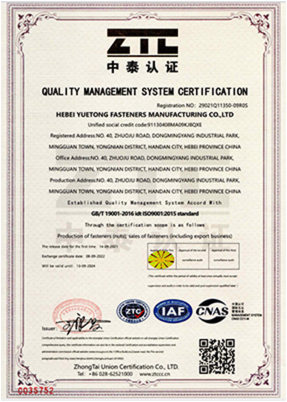Kas . 12, 2024 20:23 Back to list
different types of bolt heads
Different Types of Bolt Heads A Comprehensive Overview
Bolts are essential fasteners used in a variety of applications, ranging from construction to machinery, and their efficiency heavily depends on the type of bolt head used. The head of a bolt is the enlarged part at one end, designed to allow for the application of torque. Understanding the different types of bolt heads can help one select the right fastener for specific projects, ensuring durability and strength. This article explores several common bolt head types, their applications, and advantages.
1. Hex Head Bolts
Hex head bolts are perhaps the most widely recognized type of bolt head. They feature a hexagonal shape that allows for a wrench to grip securely, making them easy to tighten or loosen. These bolts are often used in heavy-duty applications like construction, automotive, and machinery assembly. The versatility of hex head bolts makes them a popular choice when a strong, reliable connection is necessary. Moreover, they come in various materials such as steel, stainless steel, and even plastic.
2. Allen (Hex Socket) Head Bolts
Allen head bolts, also known as hex socket bolts, have a circular head with a hexagonal recess in the center. This design allows for tightening with an Allen wrench or hex key. Allen bolts are favored in applications where space constraints make it difficult to fit a standard wrench. They provide a clean appearance and are often used in furniture assembly and automotive applications where aesthetics or reduced protrusion is essential. Their internal drive geometry also minimizes the risk of slipping during installation.
3. Torx Head Bolts
Torx head bolts feature a star-shaped pattern that requires a matching Torx driver for installation. This design provides a secure grip, reducing the likelihood of stripping the bolt head compared to standard hex or flat head bolts. Torx bolts are commonly used in the automotive industry, electronics, and appliances, where a high torque is often required without damaging the fastener. Their unique shape also allows for a smoother engagement and disengagement when compared to other head types.
different types of bolt heads

4. Phillips Head Bolts
Phillips head bolts are characterized by a cross-shaped recess that allows for a Phillips screwdriver to be used. They are widely used due to their capability to handle a substantial amount of torque while minimizing the risk of cam-out, where the screwdriver slips out of the head. However, compared to other bolt heads, they do have a tendency to strip, especially if over-tightened. Phillips head bolts are commonly found in residential applications, assembling furniture, and manufacturing environments.
5. Flat Head Bolts
Flat head bolts are designed to sit flush with the material they are fastened to, making them an excellent choice for applications where a smooth surface is desirable. These bolts can be sunk into a pre-drilled hole, providing a clean finish. They are often used in woodworking and when fastening two pieces of sheet metal together, where aesthetics or safety considerations require a level surface.
6. Square Head Bolts
Square head bolts, though less common, offer unique advantages. Their shape allows for easy installation with a wrench, providing a strong grip even when not perfectly aligned. They are often used in heavy machinery and construction applications where high clamping force and resistance to loosening are required. The square shape also minimizes the chances of rounding off the corners during installation.
Conclusion
Understanding the various types of bolt heads is crucial for anyone involved in construction, manufacturing, or DIY projects. Each type offers unique benefits tailored to specific applications, from the widely used hex head bolts to the sleek design of flat head bolts. Selecting the right bolt head not only ensures the effectiveness of the fastening but also contributes to the overall durability and reliability of structures and machinery. By recognizing the strengths of each bolt head type, one can make informed decisions that lead to safer and more efficient outcomes.


